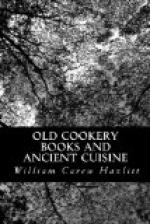But in “Vox Populi Vox Dei,” written about 1547, and therefore apparently not from the pen of Skelton, who died in 1529, it is said that the price of an ox had risen to four pounds, and a sheep without the wool to twelve shillings and upwards, so that the poor man could seldom afford to have meat at his table. This evil the writer ascribes to the exactions of the landlord and the lawyer. The former charged too highly for his pastures, and the latter probably advanced money on terms. The old poem depicts in sad colours the condition of the yeoman at the same period, that had had once plenty of cows and cream, butter, eggs, cheese, and honey; all which had gone to enrich upstarts who throve by casting-counters and their pens. The story of the “King and a poor Northern Man,” 1640, also turns upon the tyranny of the lawyers over ignorant clients.
The “Serving-man’s Comfort,” 1598, draws a somewhat gloomy picture of the times. The prices of all provisions, among other points, had trebled since the good old days, when his father and grandfather kept house. Then people could buy an ox for 20s., a sheep for 3s., a calf for 2s., a goose for 6d., a capon for 4d., a hen for 2d., a pig for the same, and all other household provisions at a like rate. The reason given by the farmer was that the landlords had raised their rent. Let them have the land on the old terms, and the former prices would pay. This plea and demand have come back home to us in 1886.
The tradition is, that when Queen Elizabeth received the intelligence of the defeat of the Armada, she was dining off a goose—doubtless about eleven o’clock in the morning. It was an anxious moment, and perhaps her majesty for the moment had thrown ceremony somewhat aside, and was “keeping secret house.”
The author of the “Serving-man’s Comfort,” 1598, also laments the decay of hospitality. “Where,” he inquires “are the great chines of stalled beef, the great, black jacks of double beer, the long hall-tables fully furnished with good victuals?” But he seems to have been a stickler for the solid fare most in vogue, according to his complaint, formerly; and he represents to us that in lieu of it one had to put up with goose-giblets, pigs’ pettitoes, and so many other boiled meats, forced meats, and made dishes. Things were hardly so very bad, however, if, as he states previously, the curtailment of the expenditure on the table still left, as a medium repast, two or three dishes, with fruit and cheese after. The black jack here mentioned was not discarded till comparatively modern days. Nares, who published his Glossary in 1822, states that he recollects them in use.
“A meal’s meat twice a week, worth a groat,” is mentioned as the farm servant’s portion in “Civil and Uncivil Life,” 1579. In “A Piece of Friar Bacon’s Brasen-heads Prophesie,” a unique poem, 1604, we read that at that time a cheesecake and a pie were held “good country meat.” The author adds:




